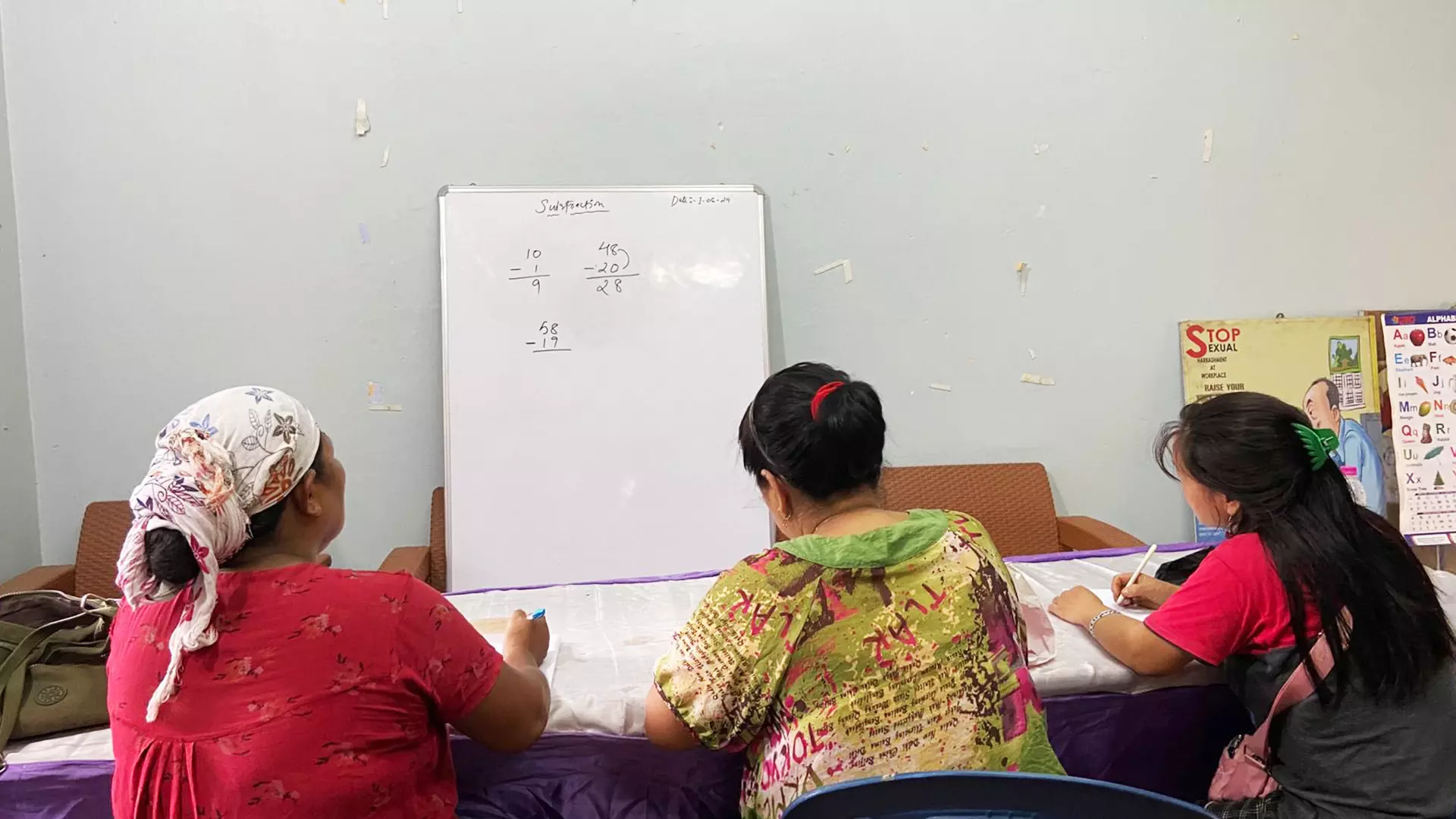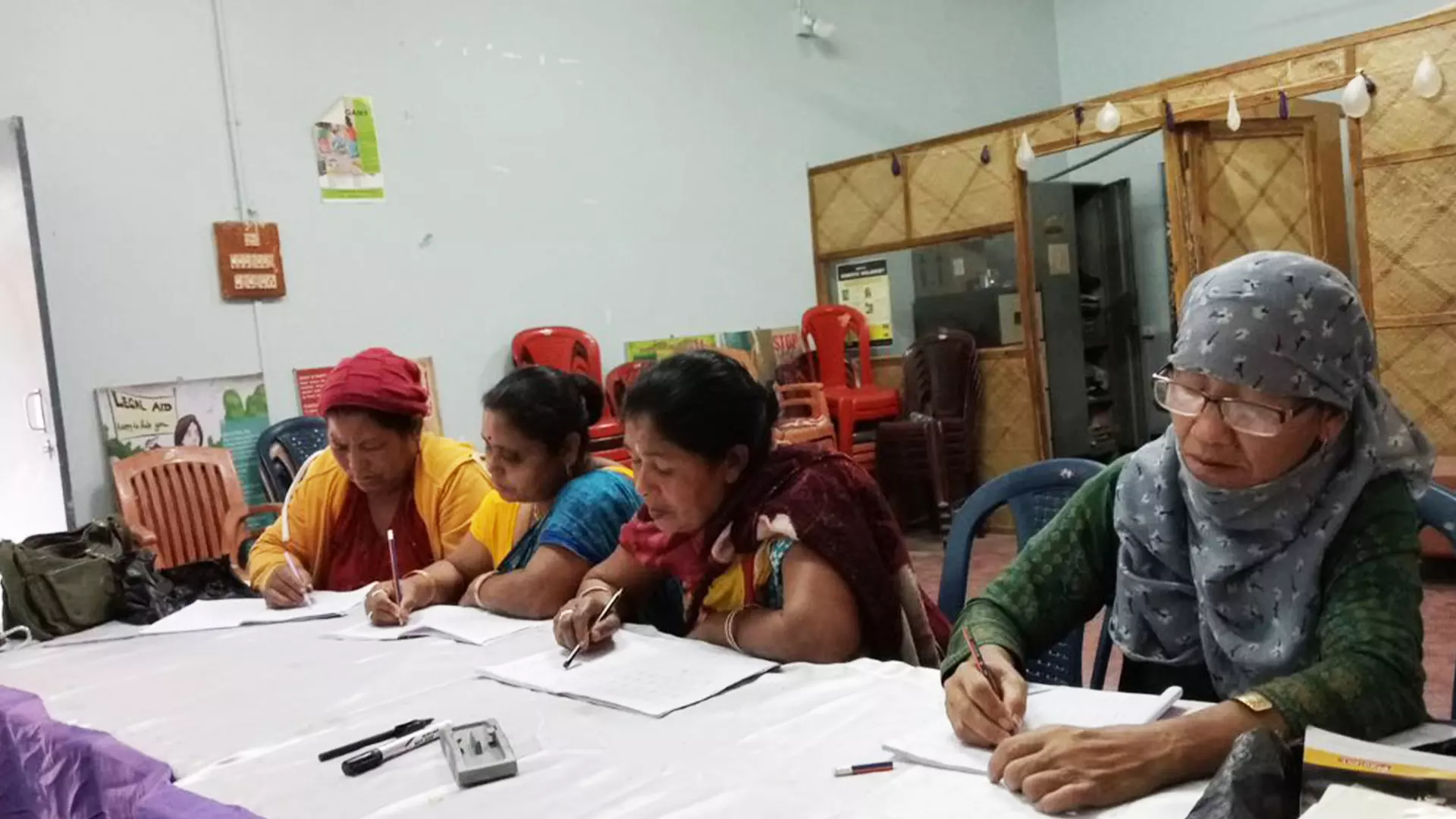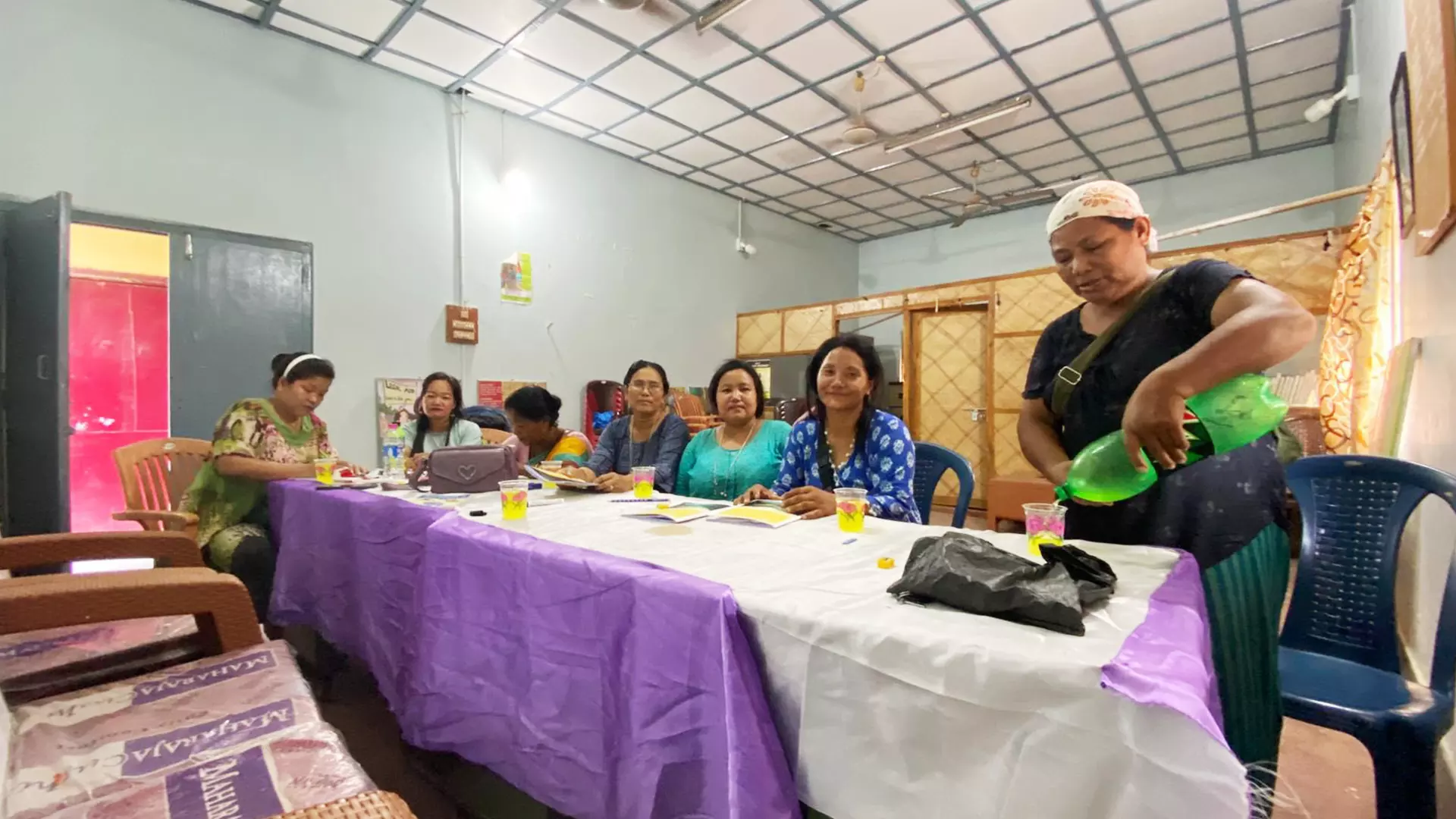
- Home
- India
- World
- Premium
- THE FEDERAL SPECIAL
- Analysis
- States
- Perspective
- Videos
- Sports
- Education
- Entertainment
- Elections
- Features
- Health
- Business
- Series
- In memoriam: Sheikh Mujibur Rahman
- Bishnoi's Men
- NEET TANGLE
- Economy Series
- Earth Day
- Kashmir’s Frozen Turbulence
- India@75
- The legend of Ramjanmabhoomi
- Liberalisation@30
- How to tame a dragon
- Celebrating biodiversity
- Farm Matters
- 50 days of solitude
- Bringing Migrants Home
- Budget 2020
- Jharkhand Votes
- The Federal Investigates
- The Federal Impact
- Vanishing Sand
- Gandhi @ 150
- Andhra Today
- Field report
- Operation Gulmarg
- Pandemic @1 Mn in India
- The Federal Year-End
- The Zero Year
- Science
- Brand studio
- Newsletter
- Elections 2024
- Events
A sisterhood of teaching and learning A,B,C,D...in Arunachal Pradesh to empower women

Saturdays are special for Mem Ete. Ete, 51, a resident of Arunachal Pradesh's Naharlagun, gets to go to "school" on the day.School is usually associated with children but the one where the vegetable vendor learns English and Arithmetic is "special". Here all students are adults and women.Albeit late in her life, Ete is fulfilling her lifelong dream of educating herself.When Ete was growing...
Saturdays are special for Mem Ete. Ete, 51, a resident of Arunachal Pradesh's Naharlagun, gets to go to "school" on the day.
School is usually associated with children but the one where the vegetable vendor learns English and Arithmetic is "special". Here all students are adults and women.
Albeit late in her life, Ete is fulfilling her lifelong dream of educating herself.
When Ete was growing up, she always wanted to attend a school like many of her friends. Instead, her parents, both farmers, made her do household chores and look after her younger siblings as a child. Ete said she never got a chance to get a formal education and remained "illiterate".
Her urge to get an education always stayed with her like an unfulfilled dream. In between, she got married and became a mother of two children, both are adults now. To run her household, she started selling vegetables almost three decades ago. Tragedy struck her family when Ete's husband died after a brief illness eight years ago.
She thought her life ended and so did her dream —"to go to a school". "Probably god heard my prayers and finally last year, I held a pencil for the first time and wrote English alphabets A, B, C, D... on a piece of paper," she smiled.

Women learn to do subtraction. Photos: Special arrangement
“Now, I can easily write A to Z without any help. I can write 1 to 100. This gives me immense pleasure. I want to learn reading and writing till I die," Ete added.
Ete is the first student of a special adult education programme for women street vendors started by the Arunachal Pradesh Women's Welfare Society, or APWWS, a feminist organisation. The programme launched in May last year has helped to provide foundational literacy and numeracy to more than 60 women — who never went to a formal school.
The classes are conducted every Saturday afternoon for two hours — from 2 pm to 4 pm — from the office building of APWWS in Naharlagun, a suburb of the state capital Itanagar.
The members of APWWS themselves teach these women students. Along with them, several students studying in colleges and universities of the northeastern state have volunteered to teach the students.
The students are also provided pen, pencil and notebooks free of cost. The average age of the learners is 30 to 60 years.
‘Educate women to educate society’
"We want to educate women to educate society. We don't want any woman — be a mother, sister, daughter or wife to remain illiterate. The idea to start classes for the women street vendors is to provide them with basic literacy to help them conduct their day-to-day activities smoothly.
"These women run their small businesses. But they can't read or write. They rely on the goodwill of customers. Sometimes they get cheated. These women never got a chance to attend schools because they come from poor and marginalised backgrounds. We want to change their status from illiterate to literate. We want to create a band of empowered women from the lowest strata of society," said Kani Nada Maling, president of the APWWS and an advocate.
Why learning is growing as a person
To continue these classes, the APWWS members are bearing all the expenses from their pockets.
"It is a part of our philanthropic work. In return, we want these women to lead a dignified life," added Maling.
Although started for women street vendors, the once-a-week classes soon became popular and attracted domestic helps, homemakers and others as students.

Learning has no age barrier, a motto of the students of the adult education programme run by the APWWS.
For that to happen, Maling and her colleagues visited various localities across Itanagar and Naharlagun to meet women working in the informal sector and tell them about the importance of education.
Along with basic English and numbers, the students are provided critical life skills including financial literacy, digital literacy, commercial skills, health care and awareness, among others.
The literacy rate in the hill state is not encouraging
As per the Census 2011, Arunachal Pradesh has the second lowest literacy rate in the country. Bihar has the lowest literacy rate in India at 61.80 per cent. The literacy rate in Arunachal Pradesh is 65.38 per cent. The male literacy rate is 72.55 per cent, while female literacy is 57.70 per cent.
Thanking her teachers, Ete said that her life had changed after she started attending the classes. “I am learning so many new things. It is one step at a time.”
“Earlier, I did not know how to identify the number plate of cars. It never occurred to me that every car has a number plate with a number and place of its registration. Similarly, now I know how to do online money transactions through my phone,” she said.
Age is just a number for learners
Ete admitted that initially she was hesitant to come to classes. “I thought I was exposed now. People will know that I never went to a school. Then I realised, thanks to the APWWS members, there is no shame in learning. And, age is just a number,” she added.
Ete's friend Soram Yaza, another vegetable vendor from Naharlagun, said she could not go to school as she was married off as a child. "I was a child bride. All I did was get married, look after the house, bear children for the family and raise them. I had to work and earn my livelihood as my family faced financial difficulties. I came here to change the way I was brought up. I too want to be educated and respected," added Yaza.
Along with learning, which sometimes gets a bit difficult, Yaza and Ete said they have a lot of fun attending the classes. "After every class, we are served snacks and cold drinks or tea. We have made a lot of new friends. We also have to write tests frequently to gauge our progress. These tests are hard, but we are ready to work harder," laughed Yaza, 40.

Students enjoying snacks and beverages after a class.
Popular singer Rerik Karlo Digbak and a member of the APWWS said that teaching the students was a learning experience for her. “I felt a sense of great accomplishment by teaching these women. Along with teaching them, I have learnt a lot from them including learning is a lifelong process,” added Digbak, winner of the Sangeet Natak Akademi’s Ustad Bismillah Khan Yuva Puraskar 2020. Her contribution to folk music and dance in the state got her the recognition.
Arunachal Pradesh has at least 37 adult education learning centres run by the education department in various districts of the Himalayan state. "Some are functioning well and others are not because of various reasons including lack of students in these centres," said an official of the education department of Arunachal Pradesh, who did not wish to be named.
Non-government organisations like the Naharlagun-based Oju Welfare Association also provide adult education to many.
